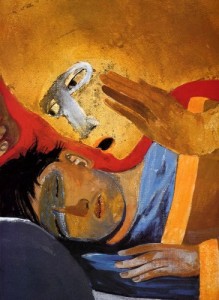Tonight, we began a more discernible and final stretch in our preparations, our keeping watch, for the Nativity of the Lord with the singing of the “O” Antiphons at Vespers. There are seven special texts –antiphons– sung at the time we sing the Magnificat. The monks and guests here at St Louis Abbey (where I am visiting until tomorrow) sang the antiphon in Latin but here it the first antiphon in English:
O Wisdom,You came forth from the mouth of the Most High, You reach from beginning to end, ordering all things mightily and sweetly: COME, and teach us the way of prudence!
For your time in Lectio I would recommend praying with the O Antiphons. Even sing them as a way of praying with the text. If you need the music go to the Advent hymn “O Come, O Come Emmanuel.” Please keep in mind, that each antiphon contains one or more Old Testament type or figure; and that each allusion has a message for those of us in the New Covenant. The OT shapes, it forms and informs our understanding of the person of Jesus we come to know in the NT. Biblical typology is crucial for Christians when reading, praying and studying the sacred Scriptures.
The following commentary adapted from The Church’s Year of Grace, Fr Pius Parsch (The Liturgical Press, Collegeville, 1959) with the assistance of JM Thompson:
In today’s O, we are pointed to the many praises of “Wisdom” in the Old Testament. One of the various senses in which the word is used refers to the divine attribute of wisdom, which is at times personified. Accordingly, we read of wisdom as proceeding from God, as being begotten of Him, as the breath of His power, the effusion of His glory. Wisdom is the beloved daughter who at the beginning of creation stood before God, assisting in the creation of the visible universe. From this concept of Wisdom, there later developed the doctrine of the LOGOS (the Word) in St. John’s Gospel.
But wisdom is also represented as a human attribute, as the foundation of all virtue. It is not so much knowledge and human prudence as knowing how to live—that is, true holiness. Its ultimate root is the fear of God (“The fear of the LORD is the beginning of wisdom”), its final goal is divine knowledge and love. The first part of today’s antiphon is from the book of Sirach (24:3); the second part is from the Book of Wisdom (8:1). In highly poetic phraseology, the origin and co-creative activity of wisdom are portrayed.
The text continues with the creative activity of the Son of God. St. John says in the Prologue to his Gospel: “All things were made by Him (the LOGOS) and without Him was made nothing that was made.” And St. Paul wrote to the Colossians: “In Him (i.e., Christ) were all things created in heaven and on earth, visible and invisible.” (Col. 1:16) Hence, according to the NT, Christ (as the pre-mundane LOGOS) is the Creator and archetype of the material universe. How beautifully our antiphon describes the LOGOS as wisdom, encompassing and ordering all things!
It is the object of this antiphon to portray the NT Creator of the invisible spiritual world, rather than the Maker of the visible universe around us. In His Church and in the soul, “He reaches from beginning to end!” “Come, teach us the way of prudence!” What an all-embracing petition! Make us perfect Christians—Christians who are wholly penetrated with the leaven of Christ…who combine strength with gentleness, strong in battle against the world and ourselves.

